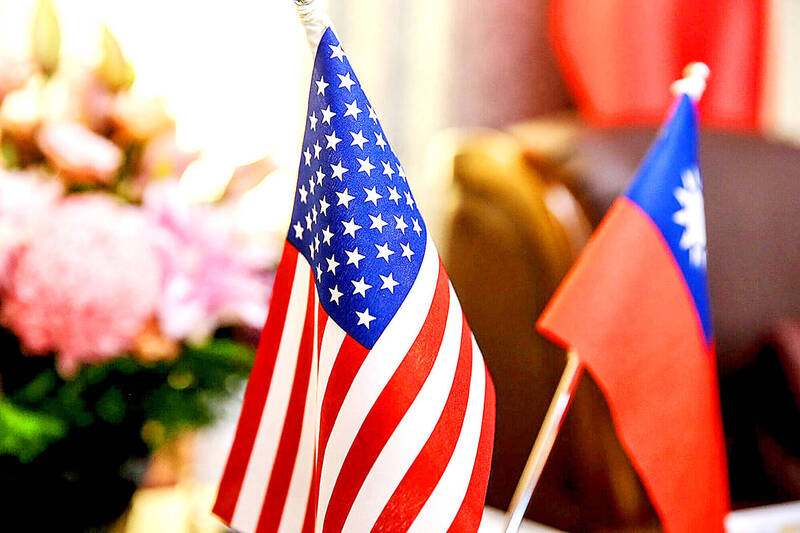《TAIPEI TIMES》 US affirms support for Taiwan defense

The US flag, left, and Republic of China flag are displayed in Taipei in an undated photograph. Photo: Bloomberg
REGIONAL PEACE: The US is supporting Taiwan’s self-defense capabilities by providing the nation with defensive arms and services, as it aims to maintain cross-strait stability
By Lee I-chia / Staff reporter
The US on Friday reiterated its support for Taiwan’s self-defense capabilities in a statement affirming its commitment to the Indo-Pacific region.
The White House said that Washington has supported Taiwan’s self-defense capabilities through a range of security assistance authorities and resources, including the first-ever use of Foreign Military Financing (FMF) and Presidential Drawdown Authority (PDA) for Taiwan, as well as International Military Education and Training (IMET).
US President Joe Biden had identified the Indo-Pacific as the critical region for the future of the US and the world, it said.
“In pursuit of regional peace, security and stability, we have reinvested in our defense presence and capabilities, integrated our efforts with partners and modernized our alliances, and collectively deterred aggression and coercion,” the statement said. “We have used a range of security assistance authorities and resources to provide Taiwan defensive arms and services necessary to maintain a sufficient self-defense capability, commensurate with the threat it faces.”
“This assistance is an important part of our efforts to maintain cross-strait peace and stability,” it said.
For a prosperous Indo-Pacific region, the US has collaborated with partners such as Taiwan, Australia, Japan and New Zealand to support small Pacific island countries by funding more than US$37 million in undersea cable projects, it said.
The Ministry of Foreign Affairs yesterday expressed its appreciation to the US for reiterating its use of FMF and PDA for Taiwan, for the IMET program, and other resources to help maintain the nation’s self-defense capability, and cross-strait peace and stability.
The US’ collaborative undersea cables projects was a good example of Taiwan’s “integrated diplomacy” strategy, the ministry said.
“Taiwan is not only an important force in maintaining regional peace and global prosperity, but also a trustworthy partner in defending global economic safety and resilience,” it said.
The Biden administration had also announced 19 arms sales to Taiwan, continuing the US policy of normalized weapons sales to Taiwan, it said, adding that the sales underscore the US’ staunch commitment to and support for bolstering Taiwan’s self-defense capabilities and resilience.
“The more secure Taiwan, the more secure the world. The more resilient Taiwan, the sounder the defense of global democracy,” the ministry said, quoting President William Lai’s (賴清德) New Year’s address.
US Secretary of State Antony Blinken has also publicly stressed that Taiwan is not China’s business, but the world’s business, it added.
Taiwan, the US and other allies and partners have cooperated to build a shared foundation for the Indo-Pacific region that is free, open, connected, prosperous, secure and resilient, it said.
By building on the solid friendship with the US, Taiwan can bolster cooperation with the incoming administration of US president-elect Donald Trump, it added.
The nation also hopes to continue demonstrating its self-defense determination by improving its defense capabilities and resilience through US arms sales, national defense reforms and whole-of-society defense resilience approaches, as well as deepening the security, economic and trade partnership with the US, the ministry said.
The White House statement also mentioned the US’ multifaceted efforts in the region, including upholding freedom of navigation and overflight in the Indo-Pacific region in accordance with international law, reaffirming its support for ASEAN, launching the Indo-Pacific Economic Framework for Prosperity and the AUKUS Enhanced Security Partnership, and collaborating with regional partners to enhance resilience against transnational threats, including climate change, natural disasters and infectious diseases.
新聞來源:TAIPEI TIMES
















